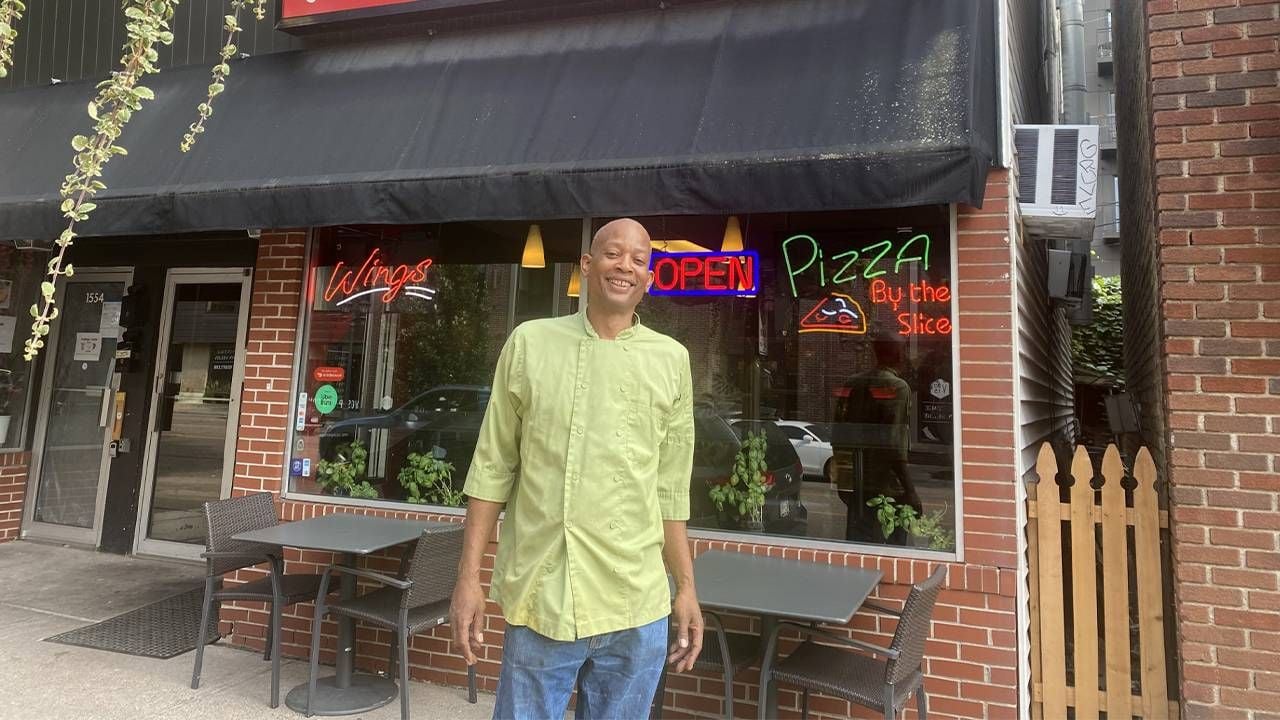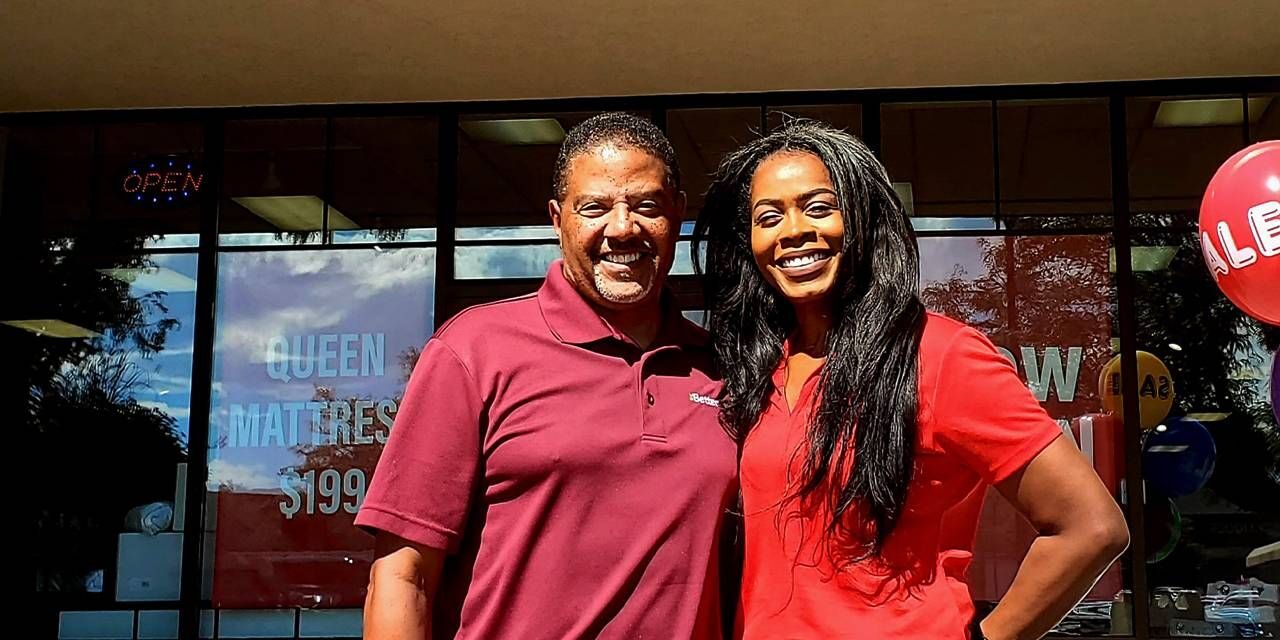A revival in startups after COVID is opening opportunities for Black small-business owners
Editor’s note: This article is part of Lessons from Leaders, a Next Avenue initiative made possible by the Richard M. Schulze Family Foundation and EIX, the Entrepreneur Innovation Exchange.
Randy Davis started out in the mattress business in Denver nearly 35 years ago, when waterbeds were the rage (remember them?). The waterbed market dried up soon after he arrived, but except for brief stints elsewhere, Davis, 57, has stuck with the business he loves.

“My heart always is with the bedding industry,” he says. “It’s a rewarding industry because of the products you sell, and sleep is important.”
Davis was laid off two years ago, when the pandemic forced his over-extended employer to retreat from its aggressive attempt to dominate the fragmented mattress industry. Davis and his wife Linda, who works for a nonprofit helping people deal with addiction, decided it was time for him to become a business owner.
Working for Himself
“I’m 54 and tired of the corporate life” he says, recalling his mood when he lost his previous job. “I know the industry like the back of my hand.”
He opened The Better Mattress in July 2022 in Denver. The only Black-owned retail mattress store in the region, The Better Mattress offers customers a large and diverse list of mattresses, including well-known brands like Simmons and Therapedic. The Better Mattress also sells bedroom furniture, sheets, pillows and other sleep-related products.
Like many Black entrepreneurs, Davis found that financial institutions weren’t interested in backing his venture. The Better Mattress is largely self-funded. “Even a minority business, which we are, they still want you to be in business for a year,” he says.
That said, Davis says he received a lot of support from suppliers and vendors who knew him by reputation. He has two experienced employees with 25 years and 16 years in the industry working in the store. He’s about to open a second location about half an hour away from his current establishment.
A Spurt of Startups
Davis is part of an unexpected resurgence in business startups that began in the latter part of 2020 during the COVID pandemic. New business creation has remained robust since then and the entrepreneurial activity is a major factor behind the economy’s remarkable resilience.
“Entrepreneurship is the key to the future of equity in America.”
Individuals filed nearly 2.7 million applications to start a business in the first six months of 2023, a 5% increase over 2022 and a staggering 52% over the same period in 2019, according to the Economic Innovation Group think tank.
To be sure, there is typically a lag of several months between filing for a new Employer Identification Number and opening for business, and not everyone follows through on their ideas. Nevertheless, the report notes that historically there has been a tight correlation between the number of applications and the direction of new-business formation.
Business application data isn’t broken down by race, but complementary data sets suggest Black entrepreneurship is critical to the overall trend. There are genuine signs of progress in deepening the ranks of Black entrepreneurs in recent years.
“Entrepreneurship is the key to the future of equity in America,” says Gary Cunningham, who recently stepped down as head of Prosperity Now, an organization focused on helping to create economic opportunity for all.
For one thing, Black business growth was heading upward before COVID. From 2017 to 2020, the number of Black-owned businesses rose by almost 14%, compared with a 0.53% gain for businesses in general over the same period, according to research from the Brookings Institution.
Accelerating Again
For another, Black women were the fastest-growing group of entrepreneurs in the U.S. in 2021, according to Global Entrepreneurship Monitor. That annual global survey of entrepreneurship found that 17% of Black women were starting or running new businesses, compared with just 10% of white women and 15% of white men.
One more data point to reinforce the message. A survey of 1,590 business owners by Gusto, a payroll, benefits and human resources technology platform for small businesses, found that 9% of new business owners in 2022 were Black and 5% in 2023. Both figures from the survey, which started in 2022 and ended in March of 2023, exceeded the 3% level recorded in 2019.
“Black-owned start-ups start smaller in terms of overall financial capital and invest less as they mature.”
Included among the factors listed by the Brookings authors of the study “Who Is Driving Black Business Growth? Insights from the Latest Data on Black-Owned Businesses“: The desire for better opportunities than those offered in the job market; efforts by large publicly held companies to spend money on developing Black-owned businesses; federal relief funds during the pandemic; and federal and state initiatives to work more with businesses owned by people of color.
The progress should be celebrated. Yet there remains a long way to go. Black people comprised 14.2% of the country’s population in 2020 but only 2.4% of all employer-owned firms.
Barriers to Black Startups
The barriers to Black entrepreneurship are longstanding and considerable. Black entrepreneurs have traditionally found access to bank credit difficult, especially compared to their white peers. Equity investors, such as venture capital firms, largely ignore Black entrepreneurs.
“Black-owned start-ups start smaller in terms of overall financial capital and invest less as they mature,” write scholars Robert Fairless, Alicia Robb, and David Robinson in “Black and White: Access to Capital Among Minority-Owned Startups.” “Black-owned startups also have lower levels of all other major sources of funding than do white-owned startups.”
Black entrepreneurs typically rely more on family and friends for financing, which may explain why it is usually easier for people in the second half of life to raise at least some money. The difficulties associated with finding finance is also why knowledge gained over the years about how an industry works is so valuable for the Black entrepreneur.
Take the experience of Tommie Daye, age 57. Like Randy Davis, he worked for decades in the same industry, in his case the restaurant business. He started out in 1988 at a supper club in Minnetonka, Minnesota. “I started out as a dishwasher and a couple of the cooks asked me if I wanted to get into cooking. I was like, ‘Yeah, I’ve never cooked before.’ (They said,) ‘We’ll show you,’ ” he says. “That’s kind of how I got into it, and I’ve been doing it ever since.”
Advertisement
Daye has held a variety of restaurant jobs over his 30-plus year career, from supervising a restaurant in the Mall of America in Bloomington, Minnesota, to managing food service at the Hennepin County Medical Center in Minneapolis.
Experience Pays Off
His wife told him that he should own his own place. She took the initiative and found the spot in St. Paul, Minnesota. Tommie’s Pizza opened in October 2018, the only Black-owned pizza shop in the city. “I believe that my restaurant front of the house and back of the house experience has helped me tremendously with operating this place,” he says.

Daye relied on family for financing, along with a shoestring budget and a DIY mindset. (For example, he built the counters at his restaurant.) The neighborhood pizzeria has evolved into a family business. He has seven children, and several of them consistently help out at the shop.
His children also have their own entrepreneurial ventures, such as hair, vintage clothing and real estate. He’s looking for locations to open another Tommie’s Pizza. “I’m having more fun than I’ve ever had in my entire career,” he says. “I work with my daughters, my nephew. My wife works here sometimes; most of my family is in and out of here all the time.”
Ambitious Growth Plans
Davis and Daye are ambitious in their expansion plans and they’re clearly having fun. Many of the businesses being created by Black entrepreneurs, especially those in the second half of life, are microbusinesses, typically defined as enterprises with 10 employees or less (including the owner). Microbusinesses in the aggregate account for nearly 80% of America’s small business ecosystem. They’re critical to the nation’s economic vitality.
“I’m having more fun than I’ve ever had in my entire career.”
Corporate America and government can still do much more to use their financing leverage and share their technical knowledge to support Black entrepreneurs and Black innovation. The investments in capital and technical business skills would help nourish the kind of enterprise that competes for third and fourth rounds of financing, has a board of directors and relationships with lawyers and other professionals.
“Storefronts are important. We need to support that,” says Cunningham. “But we also need to make sure bigger companies grow and succeed.”
The direction of change when it comes to Black entrepreneurship is positive. The startup surge is real, including among Black entrepreneurs in the second half of life. The magnitude of shift in new business formation among Black entrepreneurs is still in question, however. There’s more to be done — much more — to ensure that the recent rise in Black entrepreneurship isn’t an anomaly, but a sustainable upward trend that gathers velocity with time.





